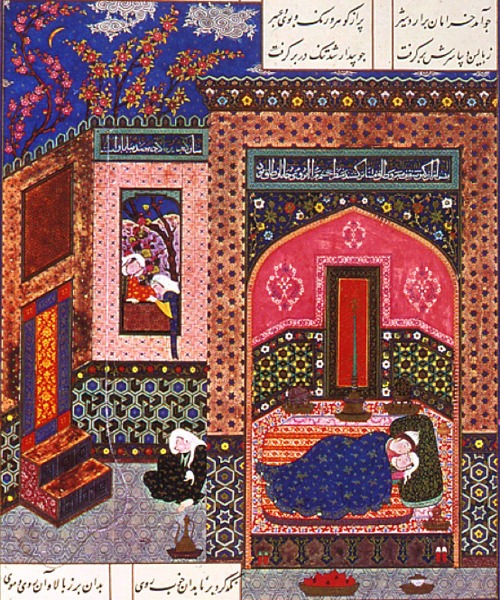I wish Iran would devote less effort to enriching uranium and more to enriching Iranian gardens and conserving Persian gardens. Persia was one of the central powers in garden history, drawing upon and influencing Mesopotamia, Central Asia, India and Islam. My own modest proposal for conserving the Bagh-e Fin will be the subject of a future blog post.
Omar Khayyám (1048-1131), born in Nishapur, was an astronomer and a garden poet. The Rubiayat of Omar Khayyam, 1120 CE, begins:
I
Wake! For the Sun behind yon Eastern height
Has chased the Session of the Stars from Night;
And to the field of Heav’n ascending, strikes
The Sultan’s Turret with a Shaft of Light.
Awake Morning: For the sun behind yon eastern height.]
II
Before the phantom of False morning died,
Methought a Voice within the Tavern cried,
“When all the Temple is prepared within,
Why lags the drowsy Worshipper outside?”
III
And, as the Cock crew, those who stood before
The Tavern shouted – “Open then the Door!
You know how little while we have to stay,
And, once departed, may return no more.”
IV
Now the New Year reviving old Desires,
The thoughtful Soul to Solitude retires,
Where the White Hand of Moses on the Bough
Puts out, and Jesus from the Ground suspires.
V
Iram indeed is gone with all his Rose,
And Jamshyd’s Sev’n – ring’d Cup where no one knows;
But still a Ruby gushes from the Vine,
And many a Garden by the Water blows.


Do you think there is a relationship between the Iranian teahouse tradition and islamic gardens as there is in Japan?[ http://www.destoop.com/trip/3%20DAYBYDAY/011031%20Erzurum/Teahouses.htm ]
Hmmm, yes there must be…[ http://www.eturbonews.com/11501/daily-tea-party-iran ]
The Wiki entry on tea says “Camellia sinensis originated in southeast Asia, specifically around the intersection of latitude 29°N and longitude 98°E, the point of confluence of the lands of northeast India, north Burma, southwest China and Tibet. The plant was introduced to more than 52 countries, from this ‘centre of origin’.” The plant must have come from this region, though Camellia sinensis grows in northern Iran. But, one wonders, was tea or wine the most popular drink in Persian gardens?
11
Here with a Loaf of Bread beneath the Bough,
A Flask of Wine, a Book of Verse—and Thou
Beside me singing in the Wilderness—
And Wilderness is Paradise enow.
Since the Islamic revolution wine production has ceased in Iran, though Shiraz grapes are grown in Australia and elsewhere, thank goodness. I have not heard of illicit fermentation of the grape in Iran, but suspect it takes place.
Here is Wendy Cope’s South London translation:
Here with a Bag of Crisps beneath the Bough,
A Can of Beer, a Radio – and Thou
Beside me half asleep in Brockwell Park
And Brockwell Park is Paradise enow.
Ah yes, the Edward Fitzgerald version, most famous and dubbed “The Rubaiyat of FitzOmar” for its poetic licence with the original text – which is entirely appropriate, of course! A literal, rhyming translation of those opening verses goes something like this:
Even from the bright rising sun
The moon that has playfully spun
We learn love, joy, and even fun
Before our time’s sand has run.
Early one morning I heard an angelic chime
Bringing news of a loving and joyous clime
Pursuit of the unimportant is the worst crime
Live in joy & love before the end of your time.
I live life just like a game
Joy by any other name
And joy till death all the same
Even my grave shall proclaim
Joy has been my only fame.
IV – can’t find this one, he probably made it up!
I watched the birds on nature’s stage
Playful, in flight, page after page
Thus opened the doors of my cage
& learnt each moment to fully engage.
As we can see, he certainly…embellished it a little! As he himself put it: “…very unliteral as it is. Many quatrains are mashed together: and something lost, I doubt, of Omar’s simplicity, which is so much a virtue in him.”
Judge for yourselves!
Tom, I admire your desire to contribute to these gardens – the finest things in life beyond our families, such as art, science, music and horticulture, have no home or boundaries. They shift through humankind like a creeping sand dune, carried wherever people will work for them. The knowledge of gardens passed through ancient Persia, on through time to you and now it is meandering back along its own steps. Whatever wisdom of horticulture existed then is alive in you now, indeed, it has been growing with each generation. I look forward to hearing what happens!
Edward
I am from Iran and i admire your desire to research in Iranian’s garden,and i wish your wish. I am architecture and i am investigating the Persian gardens too.